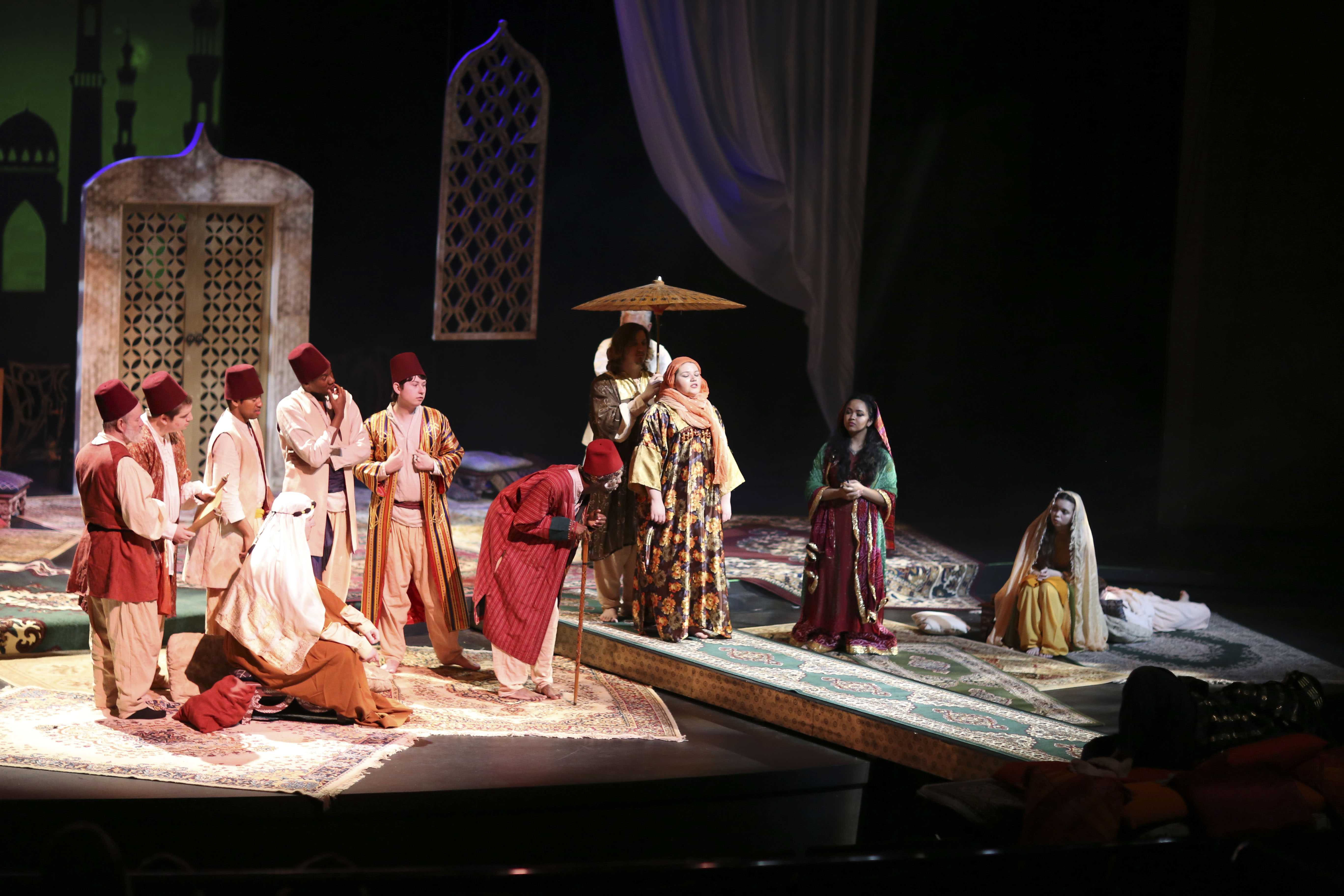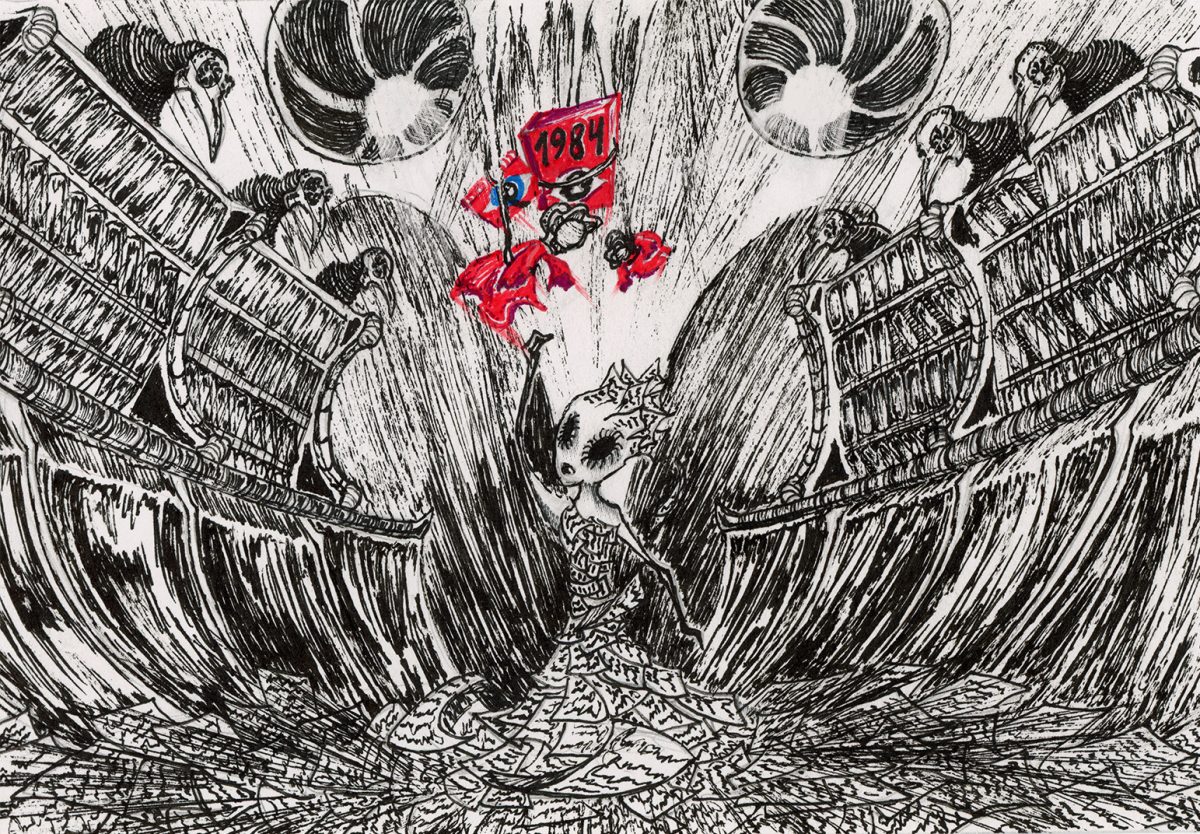By Aina Abdul-Qader
Contributing Writer

Theatre Brookhaven captivated its audience with an awe-inspiring production of “The Arabian Nights” in the Performance Hall, March 4-13.
“The Arabian Nights” was written by Mary Zimmerman and first produced theatrically in 1992. The play is an adaptation of “The Book of the Thousand Nights and One Night,” a collection of Middle Eastern and Indian stories, according to Encyclopædia Britannica.
Michael A. Robinson, a former Brookhaven adjunct faculty member, and Bonnie DePasse, a local attorney, directed the cast of 14 Brookhaven College students. Before the show, Robinson said his students were ready to put on an exciting performance and had worked really hard.
The actors take turns playing different roles in each of the vignettes. The dialogue is witty with religious tones and all of the actors effortlessly connected with their characters.
The play begins with traditional Arabic melodies and a short song performed by one of the characters. Dim red and yellow lights blanket the stage as the main character, King Shahryar, played by Jorge Montejo, enters with an angry demeanor, wearing a black turban and dark shirwal, traditional Arabian pants.

The king finds his wife in bed with another and kills them both. He loses faith in all women and decides to wed a virgin every night only to kill them by sunrise.
It suddenly dawns on the king that his servant’s daughter, Scheherazade, played by Jayden Russell, is to be married. Shahryar then claims her.
The lights dim, as Scheherazade’s father takes her hand and weeps. She fights with anger and says: “Fear not what man shall do.”
The new queen knows her destiny, yet attempts to turn it around by entertaining the king with tales, leaving each unfinished until the following day in order to extend her life.

Facing the stage is the king’s bed, where he rests as the characters took action, enacting the many stories within the original tale.
Scheherazade begins her first story about Haron al-Rashid, the king of Baghdad, played by Charles Grissom. He was dressed in white and appeared righteous and sharp. He complains to his Wazir, a high-ranking political adviser or minister in Middle Eastern cultures, played by Shah Faridie, of boredom and emptiness.
Scheherazade captures the king’s attention with the story as she continues.
The Wazir comes up with an idea, and he and King Harun make their way to the city’s madhouse in hopes of cheering up the king. They approach the house, where a 16-year-old boy is held by his arms, kneeling on the ground and pleading for mercy.
The king asks about this boy, so the boy tells his tale.
He says he is the son of a merchant who was known to be virtuous by everyone. But he was deceived by a mistress who claimed she loved him. When he refused her proposal, she planned to marry him to the ugliest girl in the city without his knowledge.
Dialogue between the bride’s father and the boy takes place as he is about to marry who he believes is the love of his life.

When he is united with his new wife, he unveils her and sees someone he was not expecting. He runs to his shop, and cries, where the woman he thought he was marrying stood waiting for him in all her glory. Suddenly, Scheherazade’s story stops.
The king demands she go on, not realizing the time of her execution had arrived.
But the king is eager to hear the rest of the tale. He orders his queen to rest until the following night, when she is to finish the story.
The queen continues telling the king one story after another. The process repeats, and by the time Scheherazade is through, she and the king have spent 1,001 nights telling and listening to the stories.
Theatre Brookhaven’s next production, “In Love and Warcraft,” debuts at 8 p.m. April 28 in the Black Box Theatre.













